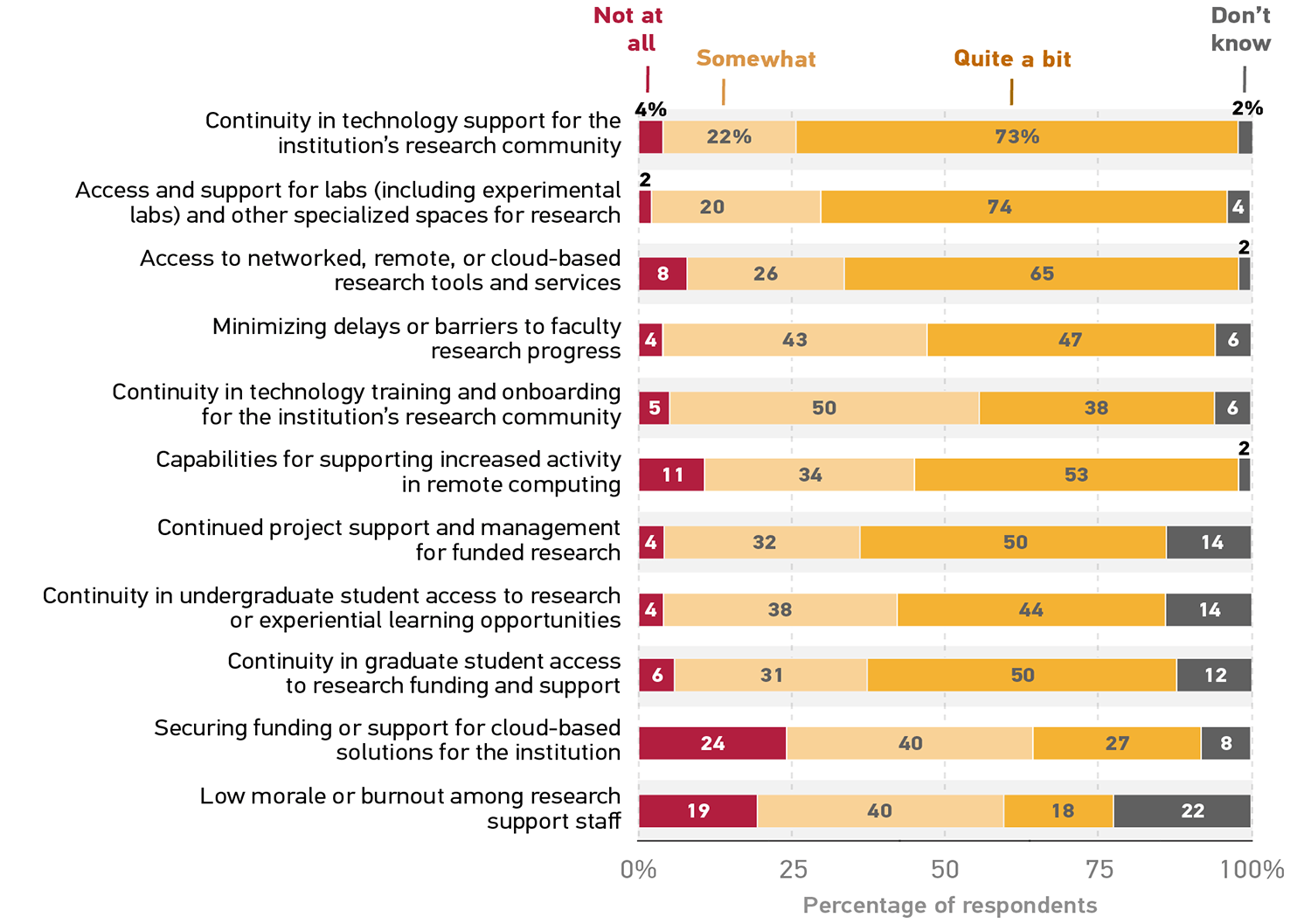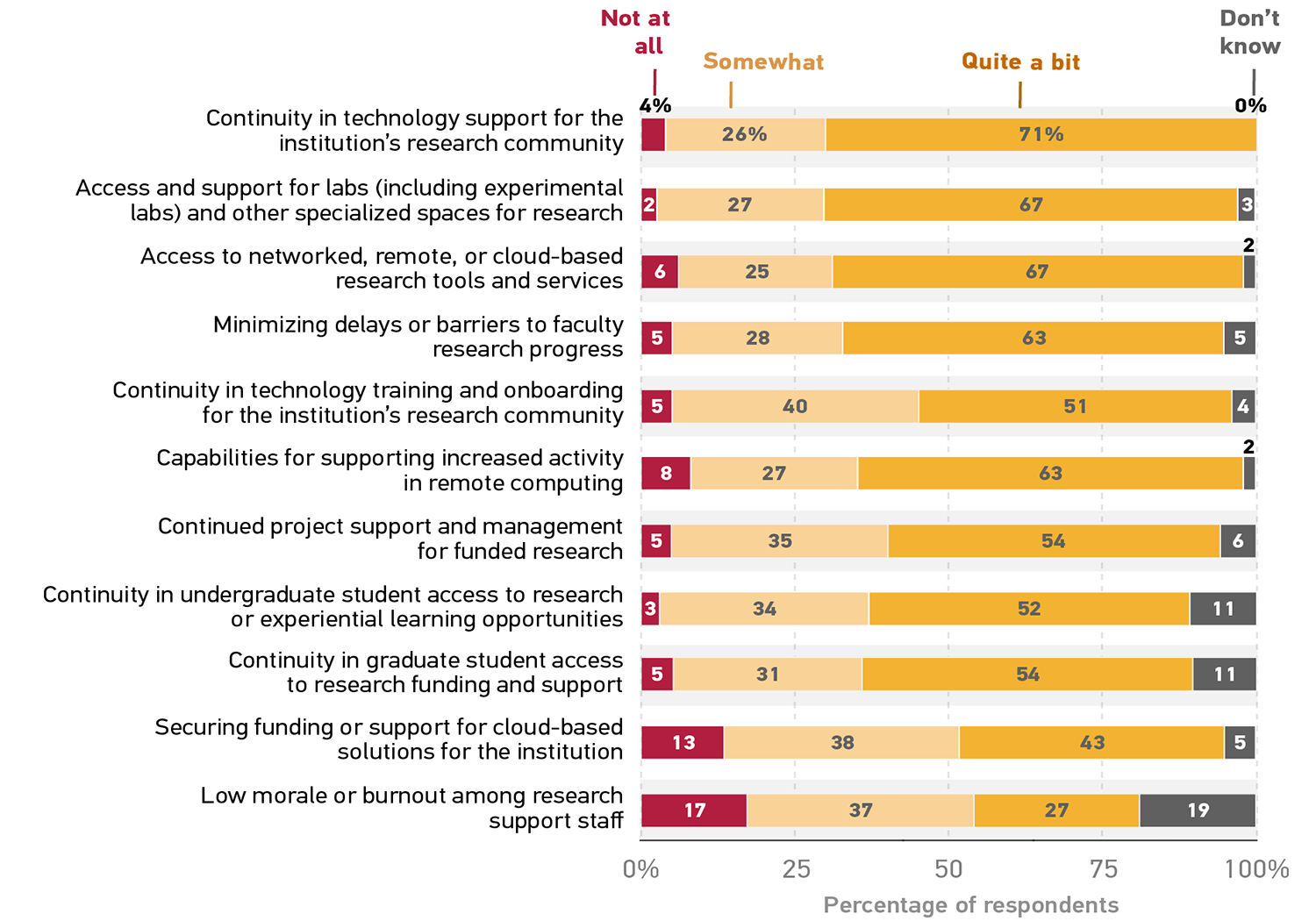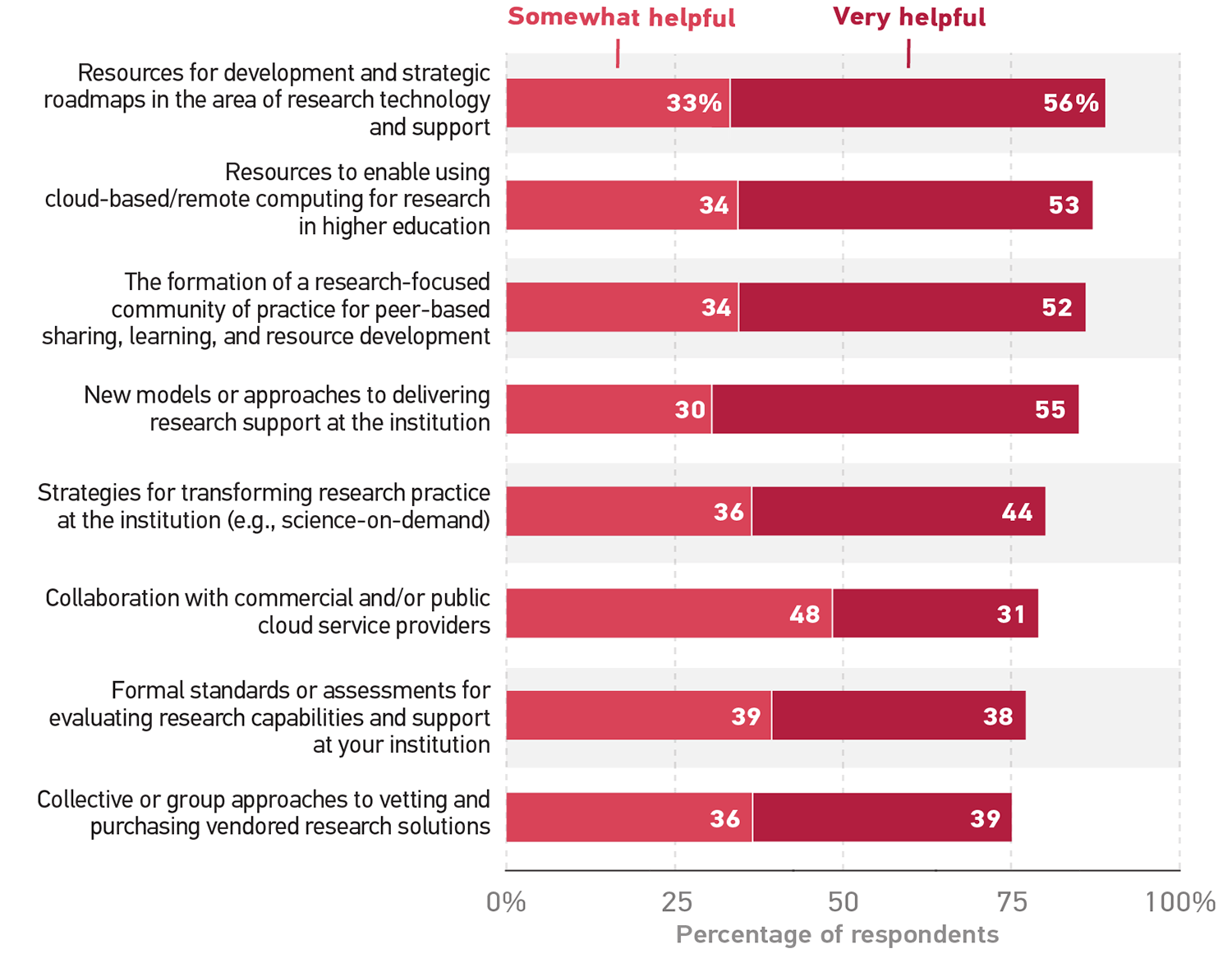Institutions are largely maintaining their core research functions in the midst of the pandemic, though future successes will rely on key technological innovations and effective cross-unit collaborations and investments.

As the COVID-19 pandemic upends higher education in 2020, institutions are relying on digital alternatives to missions, activities, and operations. Challenges abound. EDUCAUSE is helping institutional leaders, IT professionals, and other staff address their pressing challenges by sharing existing data and gathering new data from the higher education community. This report is based on an EDUCAUSE QuickPoll. QuickPolls enable us to rapidly gather, analyze, and share input from our community about specific emerging topics.1
The Challenge
As institutions innovate and evolve in the space of academic research, information technology has a critical role to play in helping researchers identify new ways of collecting, analyzing, storing, and sharing data, as well as establishing open solutions for research collaborations.2 The COVID-19 pandemic, however, has threatened to stall or at least complicate these intersections between research and IT/technology, with many institutional staff and faculty now working remotely and with researchers finding themselves in the position of having to learn new tools and systems to do their work. Perhaps even more troubling, many research universities heretofore considered relatively secure and resilient against economic turbulence may not be spared from the devastating new financial realities wrought by the pandemic.3 In the face of these challenges, where have institutions and IT units been focusing their attention in preserving research practice over the past year, and what opportunities might lie ahead for continuing to innovate and maintain higher education's focus on research? And for higher ed leaders and solution providers in particular, what resources and supports might provide the greatest benefits to institutions and researchers exploring these innovations and addressing future needs?4
The Bottom Line
Among our sample of respondents—who primarily represent doctoral institutions (79% of our sample for this QuickPoll)—we find that institutional commitments to maintaining pre-COVID levels of academic research activity are largely holding steady, despite the many challenges higher education has faced this year. In fact, the majority of respondents indicated that research is going to become even more important in the years ahead as a focus for their institution. This promising future for academic research may present opportunities for expanded collaboration between researchers and IT and technology professionals in particular, as solutions such as cloud services and high-performance computing become more important and sought-after across remote and hybrid institutional environments. These expanded collaborations will only be successful, though, to the extent that institutions are able to foster connected and positive relationships across functional units, as well as to the extent that IT organizations receive the staffing and financial resources required to effectively provide the support researchers will need.
The Data: Key Pandemic-Related Challenges
Access and service continuity have been a priority. Our poll respondents reported that since the onset of the pandemic, their institutions have been concentrating the most attention on supporting access and maintaining continuity of services. The majority (74%) said their institutions have focused "quite a bit" on access and support for labs (including experimental labs) and other specialized spaces for research, followed closely by continuity in technology support for the institution's research community (73%), and access to networked, remote, or cloud-based research tools and services (65%) (see figure 1). At the bottom of the list were issues related to securing funding or support for cloud-based solutions and low morale or burnout among research support staff. Less than one-third of institutions reported focusing on either of these areas "quite a bit," while nearly one-fourth reported not focusing on them at all.

Institutions will focus more on cloud support and reducing barriers to research in 2021. But what about staff burnout? We asked respondents to tell us where they thought their institutions would be focusing their support for academic research in 2021. Their responses were somewhat similar to what they've been doing since the start of the pandemic, with a few notable differences. Respondents anticipated that continuity and access (continuity of tech support; access to networked, remote, or cloud-based research tools/services; and support/access for labs) will remain a top priority in 2021. However, our results indicate they expect that considerably more focus will be given to securing funding or support for cloud-based solutions (43%, compared to 27% currently) and to minimizing delays or barriers to faculty research progress in the coming year (63%, compared to 47%) (see figure 2). Our respondents also told us they foresee more attention being paid to continuity in technology training and onboarding for the institution's research community, which signals that some IT units are thinking about ways to better prepare research staff and faculty to use tech tools that are either useful or required for their work in 2021. Compared to the months since the onset of the pandemic, slightly more respondents said they expect to focus in the coming year on issues related to low morale or burnout among research support staff; however, 17% said they didn't think this would be a focus at all, and 19% reported they didn't know if their institutions would be concentrating efforts in this area for 2021. These findings are particularly concerning given the increased workloads and demands that many higher education support staff have experienced as a result of the pandemic, in addition to various other challenges employees have struggled with such as child/family care, furloughs or wage freezes, and/or their own health issues. One respondent stated, "There is low to no support for research support staff. I'm great at my job, but I think of quitting every day." Institutions run the risk of losing talent at a time of critical need if issues of overwork and burnout go unaddressed.5

The Data: Overall Importance of Academic Research
Support for academic research has been just as important during the pandemic and will be even more important in the future. According to our respondents, the pandemic has not changed the overall importance of support for academic research at their institutions. While only a few said that support had become less important, well over half (66%) reported it was just as important, and 20% said that academic research support had become even more important since the beginning of the pandemic (see figure 3). When asked what disciplines/fields at their institutions have experienced the most significant challenges or reductions, biological/life sciences were rated at the top, followed by fine and performing arts, health sciences (including professional programs), physical sciences (including mathematical sciences), computer/ information sciences, and the social sciences. As one respondent noted, areas that have been impacted most tend to be "programs that require or need more social interaction and face-to-face learning and whose research requires more personal interactions and less reliance on technology." Some specific fields cited by respondents included those that are dependent on working with human subjects such as anthropology, psychology, and K–12 education, fields in which interviews, in-person exams, and field work are commonly conducted.

Two-thirds of respondents said that the importance of support for academic research at their institutions hadn't changed since the beginning of the pandemic, but what is their outlook beyond their campuses? When we asked if they thought there would be any change to the importance in this area in higher education broadly in the future, the results were markedly different. While 38% of our respondents reported it will be just as important, over half (51%) said that support for academic research will be more important in the years ahead. Given the upheaval that the COVID-19 pandemic has caused globally in practically every field, research in numerous disciplines may be considered more integral in understanding the impacts of the crisis, helping different sectors emerge from the pandemic, and studying ways to mitigate the impacts of similar events in the future.
The Data: Opportunities and Solutions for the Future
Future resources should focus on supporting new approaches to research. In light of these challenges and opportunities for institutions now and in the future, what resources and support might these institutions need in order to most effectively move their research practice and support forward? When asked to rate the helpfulness of a list of solutions and opportunities, our survey respondents rated most favorably several solutions focused on finding new ways of engaging in research practice and support, with a majority of respondents rating "Resources for development and strategic roadmaps," "New models or approaches to delivering research support," and "Resources to enable using cloud-based/remote computing" as potentially very helpful for their institution (see figure 4). Respondents also rated favorably the opportunity to establish a community of practice for peer-based sharing and learning.

Respondents appear to be slightly less interested in solutions focused on standardized evaluations and collective approaches to vetting and purchasing vendored research solutions. Though the majority of respondents still thought those solutions would be at least "somewhat" helpful, a diminished enthusiasm in these resource areas may indicate a desire to preserve localized or contextualized approaches to research support within the institution, and/or a reticence to embrace one-size-fits-all models and solutions for research.
Common Challenges
Constricted budgets and limited funds. As we've found in previous EDUCAUSE QuickPolls, the majority of institutions are experiencing significant budget decreases as a result of the pandemic. Decreases have certainly impacted IT staffing and spending generally, and these impacts include IT and technology support for research, as reflected in respondent responses to an open-ended question about their biggest challenges:
- "Loss of income leading to layoffs, leading to lack of services."
- "Funding for [high-performance computing], storage, bandwidth, especially since available resources have been shifted to COVID response."
- "Small centralized budget for university-wide research support. [We're] more focused on undergraduate student experience[s]."
- "Getting budget allocations to increase capacity for research computing."
Stresses and growing pains in research staffing. Decreases in budgets are also translating to decreases in staffing, across both the faculty and IT staff. And those faculty and staff who remain at the institution are feeling the strains of new and/or increased workloads:
- "Building a true research computing environment. We currently have three staff and just hired a director for the area, and are looking to vastly accelerate progress in this critical area."
- "Underlying staffing changes and cuts in visiting assistant professors mean that existing faculty are carrying heavier teaching loads. This leaves less time for research and other activities while we are seeking to grow research as an institution."
- "Understanding that support staff has taken on an even larger set of tasks related to the issues around the pandemic for a long period of time."
Collaborating across new remote divides. As technology and IT staff establish new ways of working with researchers and supporting their needs, building relationships across units will become increasingly critical for the success of these collaborations. Some respondents reflected on the challenges of engaging in this relationship-building through the remote environments in which most institutions are now operating:
- "Maintaining rapport between faculty/students/staff when our remote efforts rarely intersect."
- "Building camaraderie and interpersonal relationships between researchers as the work moves fully online."
- "Awareness of the support that is available to researchers of all levels through different groups across campus. How do we best reach people where they are? How do we best coordinate with each other in support when we are so distributed?"
- "Having people feel connected using virtual tools rather than in-person interaction."
COVID-19 constraints on physical spaces. For some of the research taking place at institutions, physical spaces on campus are a necessity for conducting group- and lab-based research and experiments. Recent COVID-19 restrictions on social distancing and public gatherings have led to research challenges, both in maintaining access to spaces and in continuing to bring together larger groups of students and researchers:
- "Providing safe environments for laboratory work requiring researchers' physical presence, especially those requiring work in pairs or teams."
- "Increasing numbers of COVID-19 infections causing restrictions in numbers of on-site researchers (undergrads up to faculty members)."
- "[Many campuses] maximized research space (think instruments, not [high-performace computing]) prior to the pandemic. Now, we have 8 instruments in 250 square feet—that is untenable from the pandemic-spread directive."
- "Physical distancing requirements that limit or prevent in-person collaboration and access to physical work elements."
- "Our biggest issue is that our researchers use [equipment] that requires them to be on campus. Given our current restrictions set forth by the state and county, we must limit the number of people allowed on campus, as well as the amount of time spent on campus."
Promising Practices
Supporting cloud capabilities. As researchers and staff learn to work more collaboratively and effectively through new remote environments, respondents have identified cloud and related remote-based solutions as critical for maintaining research practice in the future:
- "Figuring out how to better utilize cloud services balanced with maintaining costs."
- "Cloud providers starting to show understanding of the need for rapid deployment of solutions that can be reused by 90% of researchers."
- "Engagements with cloud service providers."
Promoting and supporting the use of high-performance computing (HPC) resources. For data-intensive research, and as an alternative to some forms of physically located experimental and lab-based research, institutions might now have an opportunity (and a stronger will among key stakeholders) to explore implementations of HPC and enriching IT's support of these capabilities:
- "More researchers have adopted high-performance computing as a result of not doing things in the experimental lab during stay-at-home orders. This has brought attention and understanding to university leadership that resources (infrastructure and staff support) for these areas need to be increased, even if we don't know how we will do it just yet."
- "Access to our new high-performance computing resource, which will be available to faculty and student researchers in spring 2021."
- "Having research-specific academic specialists [who] fully understand the available HPC infrastructure [and] can provide specialized training on HPC clusters and services."
Centralizing and building up IT research support. Effective technology and IT collaborations in building innovative research practices require an organized and robust research support function, including sufficient staffing for providing services and addressing new support needs:
- "Nurture a strong central technology support organization while allowing embedded research support units to flourish."
- "Centralization of research computing resources."
- "We can't support any of these [services] without more staff. They sound good to management, but it ends up in higher workloads for staff."
In previous EDUCAUSE QuickPolls, respondents have noted that the disruptions of the COVID-19 pandemic may be accelerating institutions' willingness to embrace digital solutions not just as stopgaps during the pandemic but as new long-term strategies for building the future of higher education. Similarly, respondents to this survey reflected on the opportunities that may now be before researchers and technology/IT staff to gain buy-in for new research innovations for the future. As one respondent noted, there is a "growing awareness at the highest levels of the university regarding the need to build capacity across the org to support computationally intensive research." Despite present-day challenges, or perhaps as a result of them, there may yet be fertile ground ahead for technology and research collaborations in higher education.
EDUCAUSE will continue to monitor higher education and technology related issues during the course of the COVID-19 pandemic. For additional resources, please visit the EDUCAUSE COVID-19 web page. All QuickPoll results can be found on the EDUCAUSE QuickPolls web page.
For more information and analysis about higher education IT research and data, please visit the EDUCAUSE Review Data Bytes blog, as well as the EDUCAUSE Center for Analysis and Research.
Notes
- QuickPolls are less formal than EDUCAUSE survey research. They gather data in a single day instead of over several weeks, are distributed by EDUCAUSE staff to relevant EDUCAUSE Community Groups rather than via our enterprise survey infrastructure, and do not enable us to associate responses with specific institutions. ↩
- Randolph Hall, "Information Technology for Open Science: Innovation for Research," EDUCAUSE Review, December 1, 2020. ↩
- Lindsay Ellis, "'A Tremendous Amount of Fear': Will Major Cuts Threaten Research Universities' Work?" Chronicle of Higher Education, December 9, 2020. ↩
- The poll was conducted on December 8, 2020, consisted of 14 questions, and resulted in 134 complete responses. Poll invitations were sent to participants in EDUCAUSE community groups focused on IT leadership and research computing. Most respondents (93%) represented US institutions, and the majority (79%) represented either public or private doctoral institutions. ↩
- Lee Bessette Skallerup, "The Staff Are Not OK," Chronicle of Higher Education, October 30, 2020; Lee Besette Skallerup, "Affective Labor: The Need for, and Cost of, Workplace Equanimity," EDUCAUSE Review, March 26, 2020. ↩
Mark McCormack is Senior Director of Analytics & Research at EDUCAUSE.
Dana C. Gierdowski is Researcher at EDUCAUSE.
© 2020 Mark McCormack and Dana C. Gierdowski. The text of this work is licensed under a Creative Commons BY-NC-ND 4.0 International License.
